Is Paint Ruined if it Freezes or Can You Salvage It?
Author: Omar Alonso | Editor: Omar Alonso
Review & Research: Jen Worst & Chris Miller

You finished your painting project last year, and the lounge looks great. After completing the job, you stored the leftover paint in the garage. After a long, cold night during the winter, you decide to repaint the dining room. Uh oh. Is paint ruined if it freezes?
After finding the paint, you open the cold tin to find the paint has frozen solid. Is that even possible? Does that mean the paint is unusable, and you need to throw it out? Or can you let it thaw and use it to paint the dining room?
Does thawed paint have the same properties as normal paint, or does it change it somehow, making it unusable for your dining room project? If paint freezes is it ruined?
Does Freezing Ruin Latex Paint?
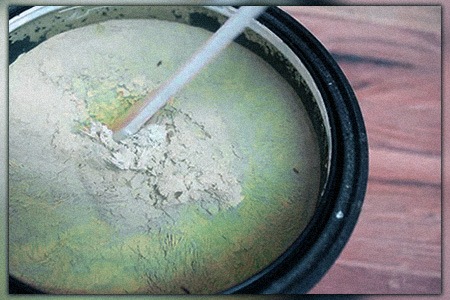
If latex paint freezes in the garage or outdoors, the freezing process can compromise its composition. As a result, it might affect its properties, and it might not provide the same performance after it thaws as it did before it froze.
While most latex paint can withstand a freeze, repeated freezing and thawing might cause permanent changes in its composition, making it unusable. So, if you store the paint in the garage, it might freeze overnight. You go back into the garage the following day and turn on the heater, and the warm room temperatures make it thaw.
If you repeat this cycle several times during the winter and then grab the paint tin a few months later, the paint might be unusable due to the repeated freezing and thawing cycles. But there's nothing stopping you from bringing it back to temperature and testing it.
After the paint thaws, mix it thoroughly and examine its viscosity, texture, and color consistency before attempting to use it. If the paint remains separated, or you see clumps or detect an off-smelling odor, it's likely ruined and should be discarded.
All latex paints contain water, and like all other products containing water, it's susceptible to freezing. So, leaving your paint in the garage in freezing conditions below 32°F will likely cause it to freeze solid. The issue with freezing paint is that it damages its emulsion properties.
Repeated freezing and thawing place more stress on the emulsion, resulting in the ruining of the paint. If it freezes once, you likely won't have any problems with it. So, if you finish a project, leave the paint outdoors, the paint freezes, and you want to use it the following day after it thaws, you probably won't have any issue with it.
However, if the paint looks like it has the consistency of cottage cheese, it appears lumpy or ropey, or it seems like it has sand in it, it's probably ruined. Using the paint on the wall would be a bad idea and likely result in a terrible finish. This goes for frozen latex of types of primer paint as well.
In some cases, depending on the inconsistency in the paint, it might be suitable to use it for touchups around the house. However, if the emulsion is ruined, the best option is to throw it away and buy a new can of paint. If paint freezes is it still good? Totally depends upon the above factors.
Does Freezing Ruin Water-Based Paint?
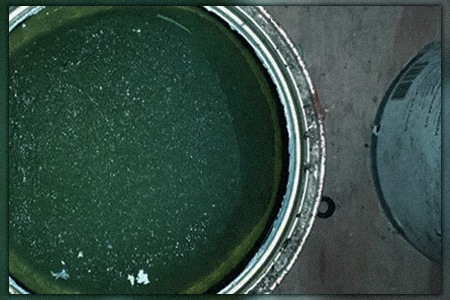
Regarding water-based paints, is paint ruined if it freezes? As long as you seal the can properly, water-based paint typically won't be ruined if it freezes and thaws out. As long as the paint has minimal exposure to the air, then the chances are it should be fine when it thaws.
Limiting the air in the tin means there's less chance of the paint freezing and causing problems with its emulsion properties and performance. However, if the paint gets cold enough, it will freeze, even if the tin has minimal air in it.
When the water in the paint freezes, it can cause changes in its viscosity, creating air bubbles in the paint. The bubbles in the paint can lead to uneven coloring. When you use the paint, it can result in cracking on the surface when it dries.
Can I Thaw Frozen Paint?
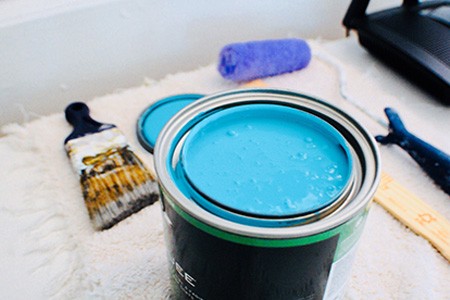
Yes. You can thaw your frozen paint and see if it's suitable for use or if the freezing ruined the process. After it thaws, stir the paint properly to mix it and check the consistency. If you notice any of the properties we mentioned earlier, throw the paint away. However, if the consistency looks good, you can probably use it. So can you use paint that has been frozen? You can depending on these circumstances.
Don't heat up the paint to thaw it; leave it in a warm room in the house and let it thaw naturally. Speeding up the thawing process will likely ruin the paint. You'll probably find it tempting to thaw the paint fast, but resist the urge and let it thaw naturally. It could take a whole day for the paint to thaw. Please don't mix it before it's fully thawed.
Checking Paint After It Thaws
After letting the paint thaw properly to its normal state, open the lid and give it a stir. For best results, take the can to the paint store and ask them to shake it. The clerk fits it to the shaking machine and vibrates the can, ensuring proper mixing of the paint ingredients.
After opening the lid, grab a paintbrush and dip it in the paint. If you notice the consistency is off and it appears lumpy, stringy, or sandy, the paint is no good and needs to be thrown away. However, if the paint is smooth and consistent, it's okay to use.
Test the paint by painting a piece of test wood. Check the paint's performance and wait for it to dry. If it dries fine, you can use it in your painting project. There shouldn't be any inconsistencies in the paint. The paint's texture and consistency (viscosity) should appear normal, or it's only good to use it for touchups on your projects.
The paint should also have a normal smell. If it smells different from when you first used it, it's probably ruined and should be discarded.
Tips for Storing Paint Properly
Storing your paint, whether latex or water-based, is important to ensure longevity. Instead of storing it in the garage, leave it indoors in the back of a storage closet or in the basement. The basement might get cold, but it probably won't get below the freezing point.
Will paint freeze in a garage? Most likely not, even if not insulated, though it can happen in that suituation. Here are more tricks to keep your paint safe in storage.
FAQ’s Regarding Frozen Paint
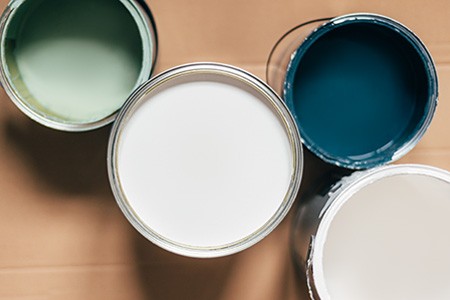
Let’s cover some more points quickly in a question and answer format related to the question of is paint ruined if it freezes or not.
If Acrylic Paint Freezes, Is it Ruined?
Of all the types of paint, varnishes and acrylic paints should never be allowed to freeze. If they freeze, then you'll need to throw them away. When these paints thaw after being frozen, they become rubbery or lumpy, making them unusable.
Does Paint Cure if it Freezes?
Most latex- and water-based paints won't cure if the temperature is below 60 °F. However, if you use the paint in cold weather, the low temperatures might cause a change in the pigmentation, resulting in a "bloom" or "blush" in the paint. As a result, the paint might appear cloudy, milky, or blotchy when applied. It might drip or run easily and lose its glossy look.
Can Oil-Based Paints Freeze?
Yes. Oil-based paints can freeze if the temperature gets low enough. However, unlike latex and water-based paints that freeze at 32 °F, oil-based paints freeze at much lower temperatures of around -4 °F. Most oil-based paints blend with linseed oil, which has a low freezing point, making the paint stable at very cold temperatures.
Ironically, storing your oil paints in the freezer at temperatures between 32 °F and 25 °F is a good strategy to prevent them from drying out. Storing it in the freezer is the best strategy to keep the paint fresh. However, let the paint return to room temperature before using it in your projects.
What Do You Do if the Paint Gets Hard?
If water-based or acrylic paints get hard, you can bring them back to normal by adding a small amount of room-temperature water to the paint and stirring it. Dip a paintbrush in some water and tap it on the edge of the tin, allowing the water spray to land in the can.
How Long Does Paint Last When Stored Correctly?
If you store your paint at room temperature, you can expect latex paints to last between two to 10 years. Acrylic paints last between two to 15 years, and chalk or water-based paints last between one to five years.
Key Takeaways Regarding Paint Going Bad When Frozen
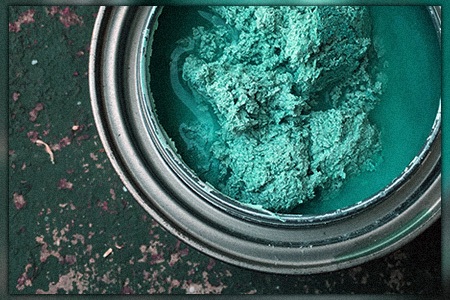
Let’s recap the main points from above regarding the question can you use paint after it freezes or not:
- If the latex or water-based paint is frozen, it might be fine to use, provided it hasn't been through several cycles of freezing and thawing.
- Let the paint thaw in room temperature conditions; don't try to fast-track the thawing process.
- After the paint thaws, mix it properly or take it to the paint store and have the attendant shake the can for you.
- Open the tin and check the consistency of the paint. If it looks ropey, sandy, or has the consistency of cottage cheese, it's bad, and you should discard it.
- Bad paint also has an off smell to it.
- If the paint's consistency looks normal, paint some on a piece of test wood, let it cure, and check the results.
The key here is that as long as the consistency seems fine once unfrozen and it doesn’t smell funny, you can mix it very thoroughly and continue using it. Mixing it down with a fresh pail of paint can help as well, just in case. If you want to dodge all these problems with freezing, you can look into paint alternatives.
Does Paint Go Bad if it Freezes? Not Necessarily
So there you have it. You now know that paint doesn’t always go bad once frozen and that there are conditions in the paint you can check for to make sure it’s still good to use. If you think it’s okay but still have some concerns, mix it into another bucket of the same paint and you’ll be fine. So, is paint ruined if it freezes? It can be, but not every time.



